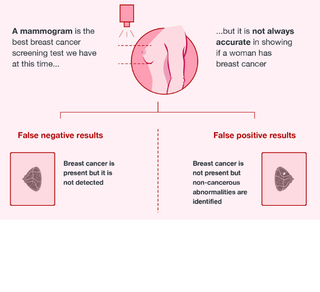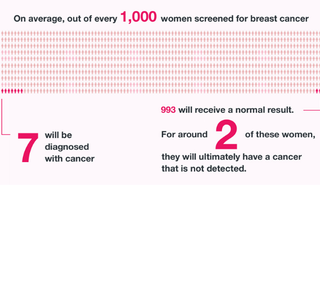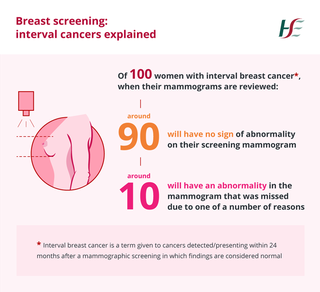Breast cancer screening can show breast cancers at an early stage. This is when the cancers are too small for you or your GP to see or feel.
If breast cancer is found early, it’s easier to treat and there’s a better chance of recovery.
Screening has limitations. It does not prevent you from getting breast cancer. Breast cancer screening may not help if you already have advanced stage breast cancer.
A negative (normal) screening mammogram means that there were no abnormalities found. It is not a guarantee that you are clear of breast cancer or that you won't develop breast cancer between screening appointments.
Two women in every thousand women screened will potentially develop an interval cancer.
Benefits of breast cancer screening
Research shows that women aged 50 and over are at a higher risk of getting breast cancer. If breast cancer is found early through regular screening, it's easier to treat. This means that your chances of surviving it are greater.
About 1 in 25 women are called back for more tests after their first screening. Being called back doesn't mean you have cancer. It may just mean that the first mammogram was unclear.
Most women are given a normal result after their second screening. But being called back for more tests can cause unnecessary worry and anxiety.
Limitations of breast screening
There is a small chance you will receive a negative mammogram result when cancer is present. This is known as a false negative result, and can happen in any screening programme.
Around 2 out of every 1,000 women screened will receive a false negative result. Around 3 in every 100 women screened will receive a false positive result.


Over treatment
Screening may lead to over diagnosis. This is because harmless lesions are also detected and unnecessarily treated.
About 1 woman in every 25 will be called back for more tests after screening. If you're called back, you may have an open biopsy. This is where a sample of tissue cells is taken from your breast and tested to see if it's cancerous.
Surgery is offered as the first treatment for most types of breast cancer.
Sometimes breast cancers are visible but are in an early stage. It's not always possible to tell which cancers will become life-threatening. As a result, some women will get treatment for a cancer that they didn't need.
Interval cancers
Screening will not pick up all cancers. Cancer can occur at any time, including between your screening appointments. These are called interval cancers and happen in every screening programme.
There are 3 types of interval cancer.
- Newly detectable cancers that have developed since the last screening appointment (common).
- Cancers that were visible at the last screen but not recalled for further tests because the signs of cancer were very subtle and thought to be normal (less common).
- Cancers that were visible at the last screen but not recalled for further tests because the signs were missed (rare).
Unfortunately interval cancers are an inevitable part of population-based breast cancer screening.

Radiation risk
The dose of radiation used in a mammogram is very small. It is within recommended limits, so the risk to your health is very low.
Being exposed to x-rays does carry a risk of causing cancer many years or decades later. But this risk is thought to be very small.
For example, an x-ray of your chest, limbs or teeth is equal to a few days' worth of background radiation and has less than a 1 in 1,000,000 chance of causing cancer.
The benefits and risks of having an x-ray will be weighed up before it's recommended for you.
If you have any concerns, talk to your doctor or radiographer about the potential risks beforehand.